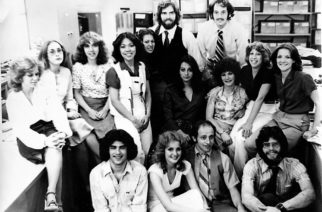
I interned for The Legislative Gazette in 1988. Ten other college students joined me. Nothing prepared me for this experience. I don’t want to speak for the others, but they would probably say the same thing. College journalism was one thing — the state Capitol was another.
Glenn Doty was the editor. Glenn was no-nonsense. I still remember the first day on the job, and it was a job. We were not really interns, we were now young professionals. For the men, it was the first time we had to wear a suit and tie every day. The women had to dress for the office. Glenn lectured us that morning about arriving to work on time and the importance of professionalism.
Walking past me, he slowed down and whispered in my ear. “Where’s your necktie?” I told him I could not find it. “Find one.” I shivered. Where am I going to find a tie in Albany? There was one hanging in the closet. It looked like it was left over from the 1970s. Kevin Hogan, our photographer, knotted it for me.
We selected our news beats for the semester. I chose elections, ethics and consumer protection, those were good choices. At the time, the Capitol was roiling in ethical violations and criminal convictions. I was so new to state government that I was not even aware of this — all I knew was that the governor was Mario Cuomo. The next day, we all went to the governor’s State of the State speech to watch him promote the “Decade of the Child.” Based on the speech, each of us then had to write stories that covered our chosen beats. That meant tracking down the committee chairs who specialized in our areas. We carried their photographs to the State of the State so we could corner them in the hallway.
We learned state government quickly. It was an immersion program. All we did was write, learn and talk state government. After writing our stories, we sat with Glenn as he edited on the computer screen. He insisted on clarity, clarity, clarity, and he hated cliches. I carry those principles with me to this day. He also told this Long Islander in no uncertain terms that Binghamton does not have the letter P.
Bear in mind that many of our readers did not know we were college students. They assumed The Legislative Gazette had permanent staff members. We were held to high standards, even by the politicos who knew we were interns. A few spokesmen for high-ranking legislators got upset with me when they thought I was playing games (I wasn’t). I had to call them to smooth things over. That was uncomfortable, but all of us had similar experiences that forced us to grow up.
Over time, we mastered our subject areas and grew more confident. At first, we did rely on press releases and covered legislative committee meetings to come up with story ideas. But a turning point for me was the day I was wandering around the Capitol building. There was almost no security back then. It was a slow news day. Maybe I was taking in the gargoyles in the Million Dollar Staircase or admiring the building’s beautiful interior architecture. At some point, I could feel a buzz in the air. Something was going on. I just knew it! I went into the Senate chamber where the legislators were about to take up an important ethics bill. There was no prior notice. I had my story.
The staff had some good times. I remember pulling an all-nighter as we watched the Legislature debate a budget bill. That’s the night I learned to drink coffee. Glenn allowed us to come in late the next day. I remember the writers sometimes fought with each other as we collaborated on stories. One of those stories was so good that I carried it in my wallet for the next three years.
1988 was a different time. We had computers in the office but they were not networked. We gave the stories to Glenn on floppy disks. No one had a cell phone. There was no Internet. I don’t even think the office had an answering machine. If we missed the return call we might miss the story. Since we all shared a large office but did not have cubicles, that meant we answered the phone and kept messages for each other. We could also listen in on each other’s phone calls.
There was also a limited budget. We did not have an AP wire machine. That would have made life easier when we were looking for story ideas or needed to fill space in the paper. Nor did we have paperboys. We had to deliver the paper around the Capitol building, the Legislative Office Building and the state agencies. This was a Monday morning ritual that burned a few hours each week. But it was quite an experience to hand out the very paper that carried our stories. We would return to work with inky hands that smudged everything we touched.
Speaking about money, we only got a $1,000 stipend from January through the end of June. Even with our student loans, we were often low on funds. I remember crawling around on the apartment floor with another intern looking for pocket change so we could buy fast food. Some of us did not even have personal phones. We used the office phones for personal calls. When the phone bill came in, the office exploded. Following a tense staff meeting with the business office, we all had to own up to our calls and pay the bill.
Some of us talked about working in Albany post-graduation. To my knowledge, two interns from my year eventually returned as journalists to the Capitol. Most of us went into local journalism, but one by one, we largely entered other fields. Maybe that’s a commentary on the state of journalism today. The Legislative Gazette is now an online publication, and local newspapers are faltering. But I have no doubt that our experience at the Gazette made us better professionals. I thank Glenn Doty for that. I also thank my fellow interns.









